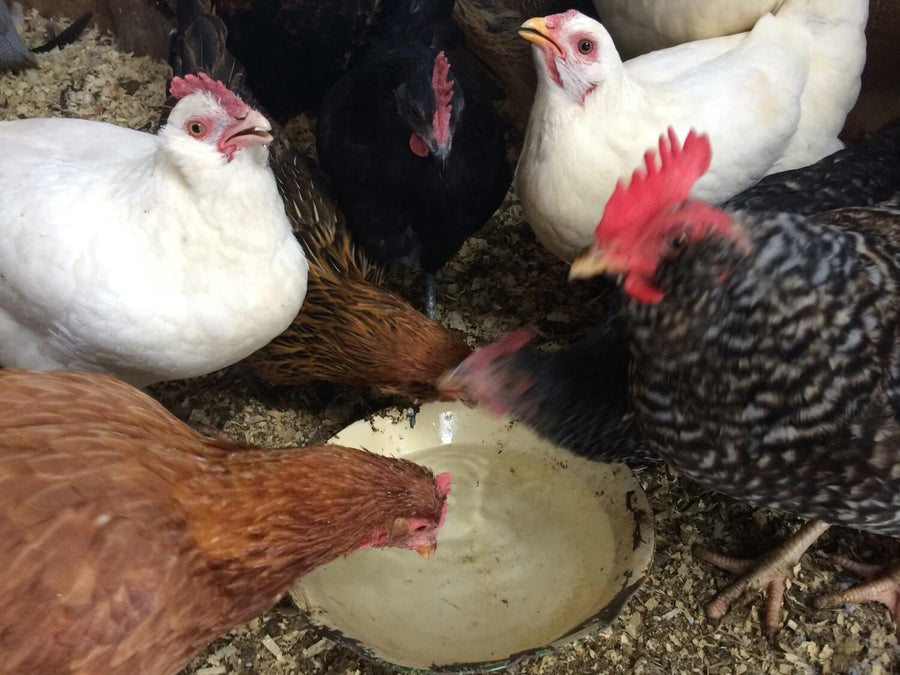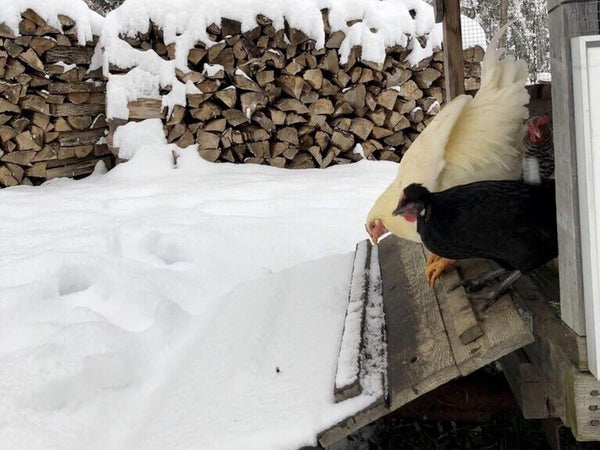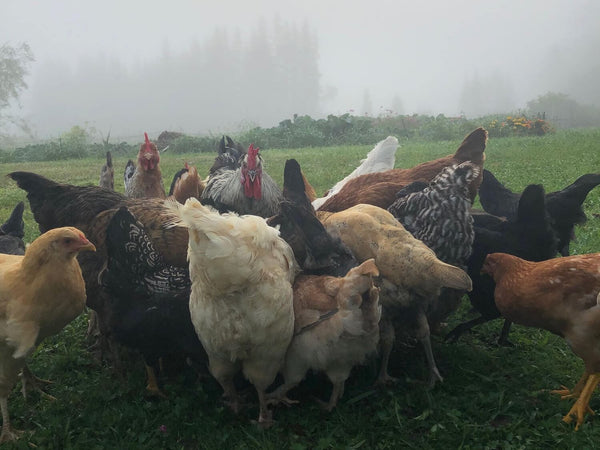
If you've ever raised or cared for another living thing, you know how emotionally draining and stressful it can be when your pet or farm animal gets sick. Knowing the ins and outs of prevention and treatment for that particular animal is key, and being prepared is the smartest thing you can do for your backyard flock.

Chicken first aid kit checklist
I like to keep a chicken first aid kit in our basement (not in our barn, nor in the chicken coop, as we will inevitably forget to bring it in for the winter, and its contents will freeze). I actually have one for each set of creatures we have on the farm. There's one for cows, complete with the most absurdly sized needles; a ridiculous assortment of homeopathic tinctures for one particularly needy cat; and the pigs have their own suite of emergency medicines and tools. The chicken one, though, feels the most potionlike, as we don’t give our flock any injections of antibiotics. For our little tiny dinosaurs, it's all about the liquids. I set reminders on my calendar to check the contents of this kit twice a year - once in spring and again in fall - to make sure I'm fully prepared, should anything befall the birds. Having done this for many years, I've accumulated quite the list of supplies, including:
- Apple cider vinegar
- Molasses
- Nutri-Drench for poultry
- Raw honey
- A box of disposable gloves
- Garlic oil
- Lavender oil
- Vegetable oil

How to prevent and treat illness and disease in your backyard flock
The best way to keep your chickens healthy is to focus on prevention. If your hens are confined to their coop, the risk of ailments will increase, whereas free roaming hens with access to fresh air and grass are less prone to sickness and disease. By focusing on prevention, you'll find yourself with fewer sick hens in the ward, fewer deaths, happier chickens, and higher quality eggs. Freedom to graze and fresh forage are essential to chicken health, and combatting the most common chicken ailments almost always involves space, time, and a healthy diet.
Give your chickens space
Hens that do not have enough personal space will inevitably become irritated, and those that are confined to smaller quarters will need their quarters cleaned very often. Simply put, easy access to fresh forage keeps hens in their natural rhythms and provides them with the healthy, varied diet they're meant to have. I try to follow a very generous rule on the farm for personal chicken space: four square feet per bird in the coop, and at least ten square feet per bird outside. If your coop doesn't allow for this amount of indoor personal space, just be certain that you are providing ample outdoor space and time for your chickens to enjoy daily.
Keep an eye out for pecking
The most common health danger to chickens that my own flocks have experienced is pecking. Chickens are naturally inquisitive birds that explore the world through their beaks. If they are bored or pressed for space, they will inevitably turn to each other for attention. Assuming that you have already addressed their spatial needs, consider some ways to alleviate boredom. This is especially important in the winter. There's a trick we use on the farm that I learned from my aunt when we first started caring for chickens in France, and it involves hanging pieces of slightly souring fruit from bailing twine on the coop ceiling, right at beak height for the birds. This gives them something to peck at, jump at, and simply consider. Just be sure to change the fruits every few days to avoid any stink or rotting.
Separate sick or hurt hens from the flock
If you have a hen that is either extremely ill or getting too much unwanted attention from her fellow flock members, you will need to separate her from the group so that she can heal. Ideally, this separation is not in complete isolation; she should still be able to hear and see her flock mates for her sanity. Isolation is considered inhumane by many animal welfare groups, and should be avoided for anything but the most dire cases. If caught early, a pecked spot on a hen's body may be bare and tender, but not yet bleeding. Separate her (providing adequate food, shelter, and water) and give her time to regrow feathers in that spot. If there is a wound, try applying some raw honey to it, which will serve as a natural antibacterial barrier. When her feathers grow back, she can go back to the group. If left unaddressed, the chickens will continue to peck at a bare spotted bird. This can lead to severe injury and even death in chickens, and should never be ignored.
Encourage dust bathing
Mites are a common nuisance to chickens and their owners, particularly in warm, wet climates. Chickens naturally combat these unwanted critters by dust bathing, which entails rolling and rubbing themselves in dirt. Dust baths must be kept dry and "clean" (meaning you should not feed the chickens near their dust bath). If you see your chickens bedraggled by mites, try mixing 1-2 cups of food grade diatomaceous earth and adding it to their dust bath. Be sure to mix well and do so while wearing a mask, as diatomaceous earth should not be inhaled. It's also a good idea to clean your flock's perches and nest boxes with a homemade spray. For this, I use a mixture of warm water, Seventh Generation dish soap, and a 20 drops of lavender essential oil. You can also spray any terribly affected hens with a homemade garlic concoction made from a 10:1 ratio of water to garlic oil, plus 20 drops of lavender essential oil. Spray the birds, clean the coop, and ensure that their dust bath is dry and clean every day for a week to ward off a mite outbreak.

Combat frostbite
Frostbite is a risk that chicken keepers like myself in northern climates always need to be aware of. On some incredibly cold Vermont nights, frostbite has hit the tips of the combs of my roosters. The overnight temperature can easily plummet to -30F here in my cold mountain hollow, and the wind can be exceptionally dangerous. In preparation for winter, I always ensure that every hole in the coop is stuffed shut with wool, and that any screen windows are boarded with plexiglass. And for those exceptionally cold nights, I add a heat lamp wired to the top of the coop to mitigate the chance of frostbite. Thanks to these precautions, my flock has never experienced bad frostbite; usually, the tip of a chicken's frostbitten comb will eventually fall off, and the bird's overall health is left uncompromised. If you find one of your hens has been affected by frostbite, monitor the bird closely to see if it affects her eating or her walking (if the frostbite is on her toes). Keep an eye on the blackened bits of her skin for any swelling, infection, or unusual odor, and if any of these symptoms do occur, separate the bird from the flock and consider calling your vet for assistance and guidance.
Monitor the flock for egg bound hens
My most dreaded chicken ailment is the egg bound hen. This occurs when a hen's egg is stuck and she cannot lay it. If not immediately addressed, this will lead to certain and painful death for the hen. Just this summer, a hen of mine was found in the most awful state: her bottom was completely swollen, with the egg stuck near her cloaca. The other hens must have noticed before I did, as they had cruelly started to peck at her swollen bottom. We tried to save her, but in the end, she had to be euthanized, as she was in an enormous amount of pain and the egg was impossible to release.
How to help an egg bound hen
Hopefully, you'll find your troubled hens before I found my ill-fated one. If you see a hen that can't seem to lay (maybe she's spending all of her time in the nest box but with no results, or perhaps she is uncharacteristically sitting still in the yard or coop), bring her to a safe, calm, quiet place in the yard or on the deck and soak her bottom in warm (but not hot) soapy water for 20 minutes. This isn't as impossible as it may sound. An injured chicken will be quite docile, and every creature - except for our feline friends - can find enjoyment in a nice warm bath. Afterwards, give the hen a boost of electrolytes and place her in a quiet, dark space by herself to encourage laying. If it is cold out, make sure she is in a warm, draft-free area, and use a hair dryer to dry her off if necessary. Repeat the bath process every hour until she has laid an egg.
If this doesn't produce results within a few tries, you will need to go in and retrieve the egg manually. With clean and gloved hands, gently massage the hen's abdomen to move the egg down. If you can see the egg at the vent of her body, you can apply vegetable oil around the vent and onto your gloved fingers to encourage movement. Very gently break the egg, allowing the shell to shatter but still remain attached to the inner membrane, then attempt to remove the egg. If this does not work, or if the idea makes you feel lightheaded, it is time to call the vet. Hens only have about 48 hours to pass an egg before it becomes lethal.

Do your research
There are many other ways for chickens to fall ill, and you will find excellent resources online through forums like Backyard Chickens that can help crowdsource the remedies to various unusual symptoms. Whenever I'm in doubt about a potentially sick or injured chicken, I will:
- Remove her from the flock
- Give her a liquid boost of 1 cup warm water, 1/4 cup apple cider vinegar, and 1 tablespoon molasses
- Wait
By afternoon, if the hen hasn't recovered, I will typically move to an online forum to try and figure out what is afoot. There is an incredible community of like-minded chicken keepers online. Don't be too shy to dive in, get to know them, and benefit from their experience and knowledge.
If you're raising chickens around young children, there are a few precautions you should take to in order to keep both parties healthy. Read on for Kate MacLean's recommendations.
A note from Pete and Gerry's: For generations, our family of farmers at Pete and Gerry's Organic Eggs has been dedicated to revolutionizing the way eggs are produced in the United States. We believe that consumers deserve better eggs from happier chickens living on small farms run by fairly paid farmers, and that's what we have dedicated our business to. We also believe deeply in the transparency and verification of our standards, which is why we became a Certified B Corporation in 2013. It's also why our farms meet the rigorous Certified Humane Free Range and USDA Certified Organic standards. We take the welfare of our hens, the sustainability of our farms, and health and happiness of our partner farmers and consumers very seriously. The resulting eggs are ones that stand out in the supermarket; they remind consumers of the eggs from their childhood farms and excursions abroad in Europe. And we're happy to be second best. In fact, we believe that everyone deserves a chance to raise hens right in their backyard and experience the joys that come with raising and growing food at home. Kate MacLean of Longest Acres Farm is here to tell you how.

Kate MacLean lives and works on 120 acres of land known as Longest Acres Farm in Chelsea, VT with her husband Nick, son Leland, and daughter Amelia. As an ex-city-dweller, she gained valuable experience working on friends' and neighbors' farms before making the move to rural Vermont with her family in search of a fulfilling, self-sustaining way of life.
Her breadth of experience in farming and raising countless varieties of chickens and other livestock on Longest Acres Farm not only makes Kate an expert in her field, but an advocate for home grown food and self-sustainability.










